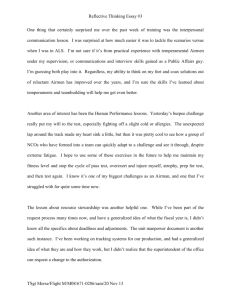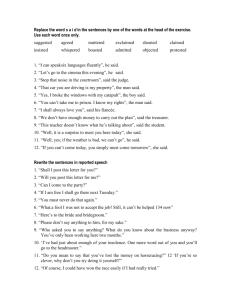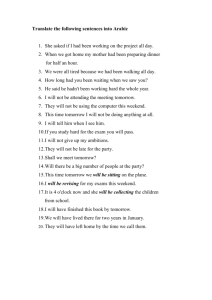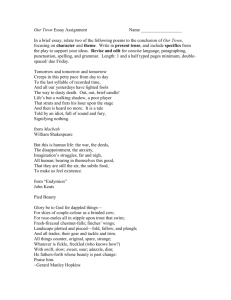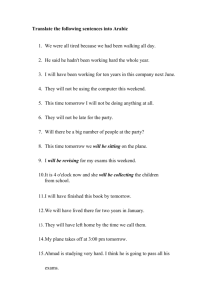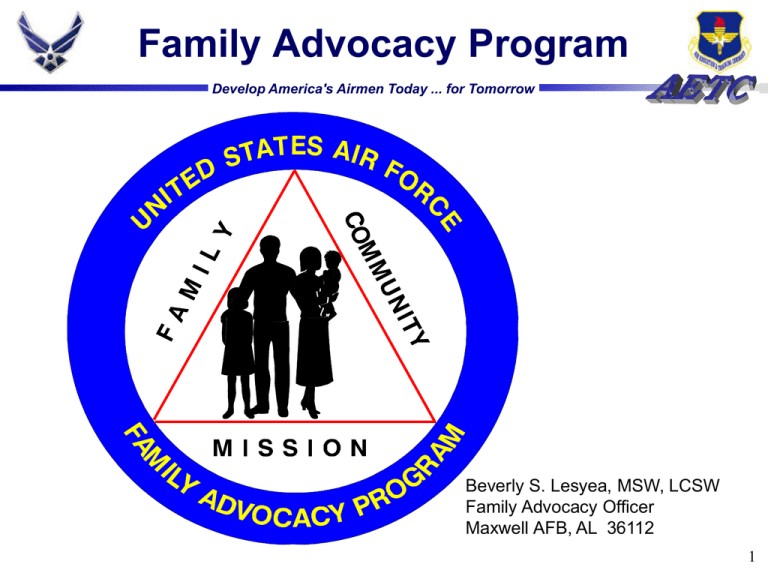
Family Advocacy Program
Develop America's Airmen Today ... for Tomorrow
Beverly S. Lesyea, MSW, LCSW
Family Advocacy Officer
Maxwell AFB, AL 36112
1
Children See, Children Do
Develop America's Airmen Today ... for Tomorrow
Family Advocacy Program Mission
Develop America's Airmen Today ... for Tomorrow
• To build healthy, stable and safe homes
for our airmen and their families
• Provide family maltreatment prevention
and treatment services for AF families
• Work difficult and sometimes
dangerous cases to protect the welfare
of our families
3
RESILIENCY ELEMENT (RE)
Develop America's Airmen Today ... for Tomorrow
Family Advocacy Program/Treatment:
• Family Advocacy Officer (FAO)
• Family Advocacy Intervention
Specialist (FAIS)
• Family Advocacy Program Assistant
(FAPA)
• Mental Health Technician
PURPOSE: FAP prevent and intervene
in family maltreatment using a multi
level approach. Primary and secondary
prevention efforts work to integrate
knowledge and awareness of family
maltreatment with necessary prevention
Of substance abuse and untreated MH
disorders with all disciplines working
toward a common goal.
Resiliency Team:
•Element Leader/Program Mgr
•Family Advocacy Outreach
Manager (FAOM)
•Family Advocacy Nurse (FAN)
•Director of Psychological Health
(DPH)
•Mental Health Technician
PURPOSE: collaborate with key
community leaders, IDS, and other helping
agencies to provide services that enhance
the resilience of AF communities and
reduce the incidence of family
maltreatment and alcohol/drug misuse.
Work to build protective factors and
minimize risk factors.
RE Focus
Develop America's Airmen Today ... for Tomorrow
•
•
•
•
•
•
•
•
•
•
•
•
Suicide prevention training and outreach
Conduct MH and wellness classes
Provide family maltreatment prevention education
Pre- and Post- deployment resiliency briefings/classes
Conduct parenting education classes
Provide substance abuse prevention and outreach programs (excluding drug
testing)
Provide briefings for Base Newcomers, First Term Airman Center, Airman
Leadership School
Conduct all MH mandatory training requirements
Promote theme month activities (e.g., Child Abuse, Domestic Violence,
Depression, Alcohol Awareness, etc.)
Provide skill building classes (e.g., Dads 101, Relaxation, Stress Mgt,
Healthy Living, etc.)
Member of Integrated Delivery System (IDS)
Collaborate with community agencies both on and off base
FAP Staffing
Develop America's Airmen Today ... for Tomorrow
Core Team
• Family Advocacy Officer (FAO)
• Treatment:
• Family Advocacy Treatment (FATM)
• Intervention Specialist (FAIS)
• Family Advocacy Outreach Manager (FAOM)
• Family Advocacy Nurse (FAN)
• Family Advocacy Program Assistant (FAPA)
FAP Program Components
Develop America's Airmen Today ... for Tomorrow
Outreach and
Prevention
and
RESILIENCY
New Parent
Support
Program
Treatment
7
New Parent Support Program
Develop America's Airmen Today ... for Tomorrow
• Provide direct support to families with children
from 0 to 3 years of age
• Home visitation by Registered Nurse
• All families with young children are offered in
office consultation and advice
8
Outreach and Prevention
Develop America's Airmen Today ... for Tomorrow
• Inform and Educate
• Maximize knowledge, skill, ability
• Foster Community Empowerment
• Advocacy, sustainability and resilience
• Forge Connections
• Promote and build collaboration,
teamwork and partnership
Outreach and Prevention Programs
Develop America's Airmen Today ... for Tomorrow
•
•
•
•
•
•
•
•
Family Advocacy Strength-Based Therapy (FAST)
Family Advocacy Safety Education Seminar (FASES)
Deployment and Reintegration
Couples Communication
Anger Management /Stress Management
Shaken Baby Syndrome Prevention
Dads: The Basics
Key Awareness Months:
• April – Child Abuse Prevention Month
• October – Domestic Violence Awareness Month
• * New AF Initiative:
• February – National Teen Dating Violence Awareness Month
Maltreatment Intervention
Develop America's Airmen Today ... for Tomorrow
• Provide individual, family, and group therapy
• Focus on alleged offenders and victims
• Developed Central Registry Board that has
decreased variability in substantiation of cases
and cut recidivism in half
• Provide prevention services as appropriate
• FAST and NPSP
Reporting Family Violence
Develop America's Airmen Today ... for Tomorrow
Mandated Reporting
And
How to Report
Who Should Report?
Develop America's Airmen Today ... for Tomorrow
AFI 40-301, 30 November 2009:
1.14. AF Members and Civilian
Employees Mandatory Reporting.
Active duty AF members and civilian
employees (including contract
employees) will report all incidents of
known or suspected family maltreatment
immediately to the FAP.
W
Who Should Report?
Develop America's Airmen Today ... for Tomorrow
AFI 40-301, 30 November 2009:
1.15. Air Force Reserve Command’s (AFRC) Director of
Psychological Health and Psychological Health Advocates.
Where available, the AFRC’s Director of Psychological Health and
regional Psychological Health Advocates may coordinate services
between reserve personnel, FAP staff, and civilian authorities.
1.16. Air National Guard (ANG) Director of Psychological Health
(DPH) and State/Territory Directors of Psychological Health.
Where available, the ANG state or Territory Director of Psychological
Health may coordinate services between ANG personnel, FAP staff,
and civilian authorities. Other aspects of FAP are not applicable or
available for ANG members.
Leadership’s Role
Develop America's Airmen Today ... for Tomorrow
AFI 40-301 (30 November 2009):
• 1.7. Unit (Squadron) CCs and CCFs
• 1.7.1. Completes the DoD-mandated FAP CC and SNCO
training on family maltreatment, including identification
and reporting protocols, within 90 days of assuming their
positions and at least annually, thereafter.
• 1.7.2. Reports all suspicions of family maltreatment to
FAP.
• 1.7.3. Directs suspected active duty AF family
maltreatment offenders to FAP for comprehensive
assessment and service planning.
• 1.7.4. Completes CRB computer-based training annually
and participates in the CRB for incidents involving their
Squadron/unit members.
How to Report
Develop America's Airmen Today ... for Tomorrow
• Report allegations of adult partner
maltreatment/child maltreatment to the
Family Advocacy Program
• During the duty day call FAP
• After hours contact the Mental Health On-Call
Provider via the Command Post
Develop America's Airmen Today ... for Tomorrow
Central Registry Board
17
Central Registry Board
Develop America's Airmen Today ... for Tomorrow
• Log onto to: https://www.airforcefap.af.mil
• CAC Card Required
• No username or password required to
complete the training
Develop America's Airmen Today ... for Tomorrow
Develop America's Airmen Today ... for Tomorrow
Develop America's Airmen Today ... for Tomorrow
Develop America's Airmen Today ... for Tomorrow
Central Registry Board
Develop America's Airmen Today ... for Tomorrow
Wing CV serves as Chairperson
•Membership includes:
•Command Chief
•Security Forces
•Office of Special Investigations
•Staff Judge Advocate
•Family Advocacy Officer
•Squadron Commander
All are voting members EXCEPT OSI
DoD Central Registry
Develop America's Airmen Today ... for Tomorrow
•
Database cannot be accessed by sources
outside the DoD
•
Database does not affect AD careers
•
Cases that do not meet AF criteria for abuse
are entered with no identifying information
•
Cases that do meet criteria for abuse stay in
system permanently
Maltreatment
Develop America's Airmen Today ... for Tomorrow
Who is our Client
and
Types of abuse
Don’t Ask, Don’t Tell
Develop America's Airmen Today ... for Tomorrow
Changes based on repeal of Don’t Ask, Don’t Tell
• Definitions of: Domestic Abuse, Domestic Violence,
Intimate Partner, Victim and Alleged Offender
• The phrase “of the opposite sex” has been removed
• Definition for spouse and family member has not changes
• Adult partner and/or child maltreatment occurring in samesex partner relationships or families will be referred to FAP
for assessment and intervention services
DoD 6400.1-M-1, Manuel for Maltreatment and Domestic Abuse Incident Reporting
System, July 2005, and DoD 6400.06, Domestic Abuse Involving DoD Military and
Certain Affiliated Personnel, August 21, 2007 are changed to Incorporate Change 1,
September 20, 2011.
27
DoD Definition of Domestic Violence
Develop America's Airmen Today ... for Tomorrow
Domestic Abuse: (1) Domestic violence or (2) a pattern of behavior resulting
in emotional/psychological abuse, economic control, and/or interference with
personal liberty when such violence or abuse is: directed toward a person of
the opposite sex who is:
(a) A current or former spouse
(b) A person with whom the abuser shares a child in common
(c) A current or former intimate partner with whom the abuser shares or has shared
a common domicile
Domestic Violence: An offense under the United States Code, the Uniform
Code of Military Justice, or State law involving the use, attempted use, or
threatened use of force or violence against a person of the opposite sex, or the
violation of a lawful order issued for the protection of a person of the opposite
sex, who is:
(a) A current or former spouse
(b) A person with whom the abuser shares a child in common
(c) A current or former intimate partner with whom the abuser shares or has shared
a common domicile.
28
Types of Maltreatment
Develop America's Airmen Today ... for Tomorrow
Child and Adult Partner
Physical
Emotional
Sexual
Neglect
29
Partner Physical Abuse
Develop America's Airmen Today ... for Tomorrow
Non-accidental use of physical force against a spouse or intimate
Partner
•
Physical force includes but is not limited to at least one of the following: hitting
with open hand or slapping, including spanking, dropping, pushing or shoving;
grabbing or yanking limbs or body, poking; hair-pulling; scratching; pinching;
restraining; squeezing, shaking; throwing; biting; kicking; hitting with fist; hitting
with a stick, strap, belt or electrical cord or other object; scalding; burning;
poisoning; stabbing; applying force to throat; strangling or cutting off air
supply; holding under water; brandishing or using a weapon
• Impact
1. Any physical injury
2. Reasonable potential for more than inconsequential physical injury
3. More than inconsequential fear reaction
AF Family Advocacy Program
Family Maltreatment Definitions
Partner Emotional Abuse
Develop America's Airmen Today ... for Tomorrow
Non-accidental act or acts (excluding physical or sexual abusive
acts) such as
•
•
•
•
•
•
•
•
•
Berating, disparaging, humiliating victim
Interrogating victim
Restricting victim’s ability to come and go freely
Obstructing victim’s access to assistance (including but not limited to, law
enforcement, legal, protective, or medical resources, including FAP, a
victim advocate, military command or DV Shelter)
Threatening victim
Harming, or indicating that alleged abuser will harm, people/things that
victim cares about, such as children, self, others, pets, property
Restricting victim’s access to or use of economic resources
Stalking victim
Trying to make victim think that s/he is crazy (or make others think that
spouse is crazy)
Impact:
1. Psychological harm: (a) Fear; (b) Psychological distress; (c) Fear which
impacts victim’s ability to carry out normal activities; i.e., work, education,
religion, medical/MH services, contact with family friends; or,
2. Stress related somatic symptoms
Partner Sexual Abuse
Develop America's Airmen Today ... for Tomorrow
A sexual act with spouse or intimate partner, without the consent
of the spouse or intimate partner, or physical contact of a sexual
nature against the expressed wishes of the spouse or intimate
partner. Corroboration of the report of the spouse or intimate
partner is NOT required
A1. The use of physical force to compel the partner to engage in a
sex act against his/her will, whether or not the sexual act is
completed
A2. The use of physically aggressive act, or use of one’s body,
size, or strength, or an emotionally aggressive act to coerce the
partner to engage in a sexual act (attempted or completed)
A3. An attempted or completed sexual act involving a partner who
is unable to provide consent
AF Family Advocacy Program
Family Maltreatment Definitions
Child Physical Abuse
Develop America's Airmen Today ... for Tomorrow
Non-accidental use of physical force on the part of a child’s
caregiver
•
Physical force includes but is not limited to: hitting with open hand or slapping,
including spanking; dropping; pushing or shoving; grabbing or yanking limbs or
body; poking; hair-pulling; scratching; pinching; restraining or squeezing;
shaking; throwing; biting; kicking; hitting with fist; hitting with a stick, strap, belt,
electrical cord or other object; scalding; burning; poisoning; stabbing; applying
force to throat; cutting off air supply; holding under water; brandishing or using
a weapon
• Impact
1. Any physical injury
2. Reasonable potential for more than inconsequential physical injury
3. More than inconsequential fear reaction
AF Family Advocacy Program
Family Maltreatment Definitions
Child Emotional Abuse
Develop America's Airmen Today ... for Tomorrow
Non-accidental act or acts ( excluding physical and sexual abusive
acts) such as
•
•
•
•
•
•
Berating, disparaging, degrading, scapegoating, humiliating child
Threatening child (implying future physical harm, abandonment, sexual
assault)
Harming/Abandoning
Confining child
Coercing child to inflict pain on him/herself
Disciplining child excessively
Impact
1. Psychological harm: (a) Fear; (b) Psychological distress
2. Reasonable potential for psychological harm
3. Stress related somatic symptoms
AF Family Advocacy Program
Family Maltreatment Definitions
Child Sexual Abuse
Develop America's Airmen Today ... for Tomorrow
Sexual activity by an alleged offender with a child for the purpose of sexual
gratification of the child, the alleged abuse, or any other person
•
Non-contact exploitation: Forcing, tricking, enticing, threatening or pressuring
a child to participate in acts for anyone’s sexual gratification without direct
physical contact between child and offender
•
Rape: Use of physical force, emotional manipulation, or a child’s youth or
naiveté to engage in penis-vulva or penis-anus penetration (of child,
perpetrator, or both), however slight
•
Other sexual assault: Physical contact of a sexual nature between child and
perpetrator not involving penis-vulva or penis anus penetration, including but
not limited to
•
•
•
•
•
Oral-genital or oral-anal contact
Non-penile penetration of vulva or rectum
Attempted penetration of the vulva or rectum
Groping, rubbing, fondling, stroking or similar behavior-directly or through
clothing
No impact vote required for sexual abuse
Neglect
Develop America's Airmen Today ... for Tomorrow
• Partner Neglect: Alleged abuser withholds necessary care or
assistance for his or her current spouse who is incapable of self
care physically, psychologically or culturally, although the
caregiver is financially able to do so or has been offered other
means to do so
• Child Neglect: Egregious act(s) or omission(s) on the part of
the child’s caregiver that deprives the child of needed ageappropriate care
•
•
•
•
•
•
Lack of supervision
Exposure to physical hazards
Educational neglect
Medical neglect
Deprivation of necessities
Abandonment
AF Family Advocacy Program
Family Maltreatment Definitions
Unrestricted Reporting
Develop America's Airmen Today ... for Tomorrow
• Unrestricted reporting is the process you are familiar
with –
• FAP is notified of Family Maltreatment Incident
• FAP notifies
•
•
•
•
CC/CCF
SFS
OSI
CPS (if children are involved)
37
Domestic Abuse Reporting Options
Develop America's Airmen Today ... for Tomorrow
AFI 40-301, 30 November 2009:
4.7. Domestic Abuse Reporting Options.
4.7.1. Unrestricted Reporting for Domestic Abuse
4.7.2. Restricted Reporting (RR) for Domestic Abuse
4.7.2.1. RR is a process allowing an adult victim of domestic abuse,
the option of reporting to specified individuals for the purpose of
receiving medical care, supportive services, and/or advocacy and
information without initiating the investigative process or notification to
the victim’s or alleged offender’s CC.
4.7.2.1.1. When sexual assault occurs between spouse or
unmarried intimates it is domestic violence and will be managed
by FAP.
4.7.2.1.2. Once FAP assumes case management of domestic
abuse sexual assault cases, no information about the case is shared
with the SARC without the client’s consent.
Restricted Reporting
Develop America's Airmen Today ... for Tomorrow
• Who is Eligible for Restricted Reporting:
• Adult (ADM or FM)
• Victim of domestic abuse/violence (ADM or FM)
• Eligible to receive services in the medical treatment facility
• Restricted Reporting does not apply to Child
Abuse Reports (emotional, neglect, physical, sexual)
Restricted Reporting
Develop America's Airmen Today ... for Tomorrow
• Who may have knowledge of the abuse and maintain
the DV Restricted Report?
•
•
•
•
All health care providers and their support staff
All FAP staff
SARC
Military One Source
Restricted Reporting
Develop America's Airmen Today ... for Tomorrow
Restricted Reporting Process:
Adult victim of domestic violence is offered information about
Restricted vs. Unrestricted reporting by Health Care
Provider (HCP).
HCP notifies FAP
FAP completes safety assessment and explanation of
Restricted vs Unrestricted Reporting option
FAP coordinates victim services
DV RR does not go to CRB unless the report becomes
Unrestricted
*Important to become familiar with DV RR process at your
installation
Develop America's Airmen Today ... for Tomorrow
Questions?
42

